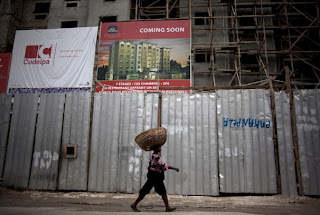Going for Broke: The Corporate Players Behind the Demise of the Caribbean Banana Trade (Part 2)
May 31, 2012 NACLA.org The more a corporation can drive down the cost of their products and/or services, the larger the profit. This is a fundamental rule which is especially apparent in the banana industry. Walking down the produce aisle in your local supermarket, you might have noticed that banana prices have hit historical lows during a time of rising food prices. The reality of these cheap prices is that bananas, like milk, are often sold at a loss to customers in order for supermarkets to attract customers who will purchase other items during their trip. Any trip to a major grocery store will reveal that a pound of bananas costs anywhere from 65 to 89 cents. This is because bananas are what retailers call a “Known Value Item” which refers to a basic everyday product to which the consumer is ver y price-sensitive. Photo credit: www.gerry.odonoghue.com Price wars between supermarkets in an effort to gain the lowest possible cost of bananas has led to a race to the bot

